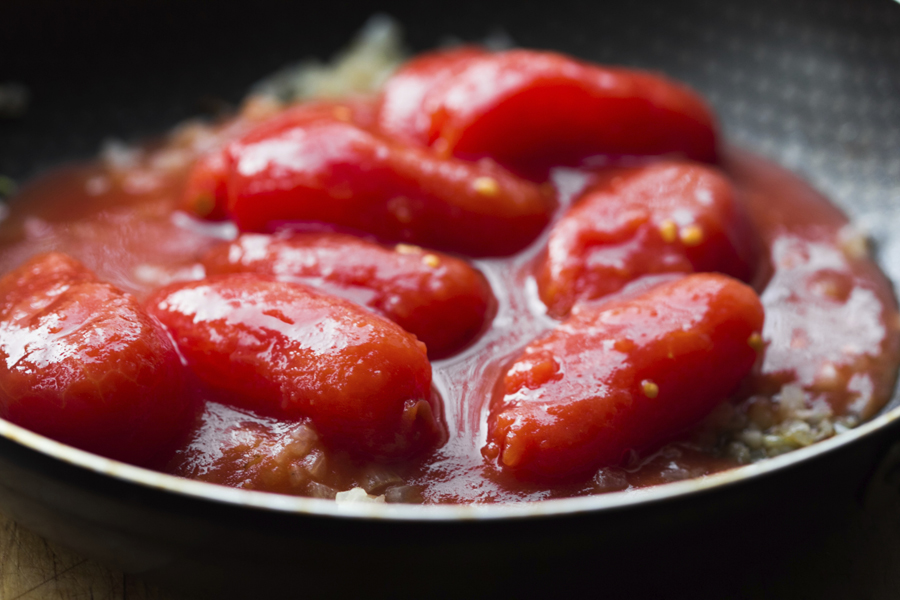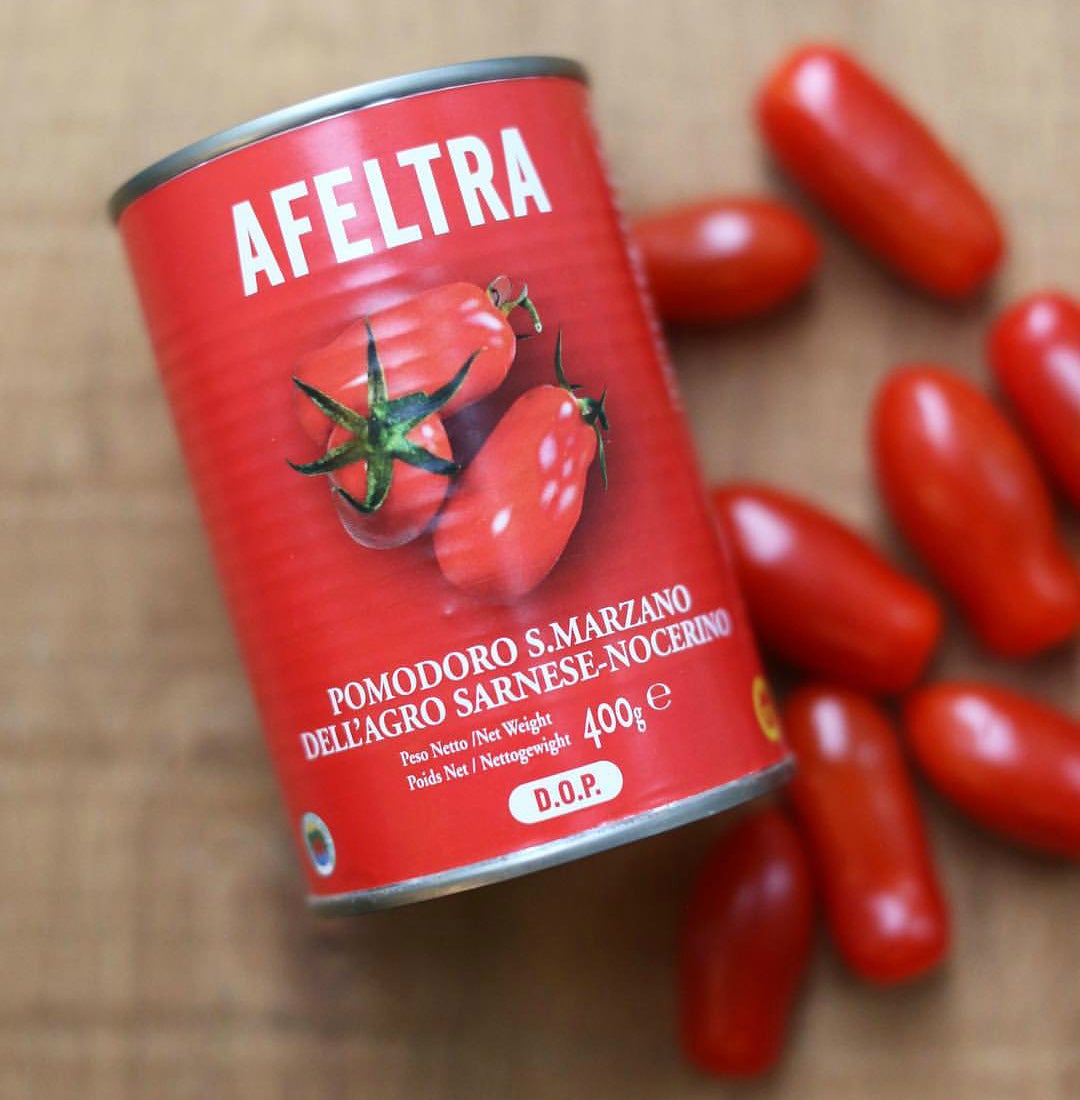
San Marzano tomatoes are prized for their balanced flavor and distinct tomato-iness. Yet as home cooks become more and more enchanted with the Italian variety, questions arise over what exactly is in that can with the San Marzano label.
The hype around San Marzanos, the sweet Italian plum tomatoes from Campania, has always been a bit of a mystery to me. Sweet, pulpy, low in acidity, and containing few seeds, they are said to be extraordinarily good for making sauces—and basically the only recognized name in the canned-tomato game. The long, meaty tomatoes are actually structurally distinct from most other plum tomatoes, containing only two seed pockets instead of the typical five. And in near mythical fashion, old Italian farmers grow them in the volcanic soil around Mount Vesuvius, which famously erupted in AD 79, leveling the Roman cities of Herculaneum and Pompeii in a vicious flood of molten lava.
Out of all that devastation comes the beauty of San Marzanos. It’s that volcanic soil and the microclimate—fanned with sea breezes from the Gulf of Naples—that accounts for their prized balanced flavor and tomato-iness. In Italy, tomatoes labeled as “San Marzano” must adhere to strict DOP (the Italian protected designation of origin) guidelines, which governs where they’re grown and how they’re processed. If you try growing the same seeds—“San Marzano” refers to both the plant and DOP—elsewhere, you just won’t get the same thing. The tomatoes are so revered in Italy that to make true Neapolitan pizza, according to the Associazione Verace Pizza Napoletana, you must use San Marzano tomatoes. Anything else will not do.
And yet you’d be hard-pressed to find a cooking magazine or website here in America that recommends them. Among the most essential of essential pantry staples, the quality of canned tomatoes can make all the difference in a dish, as opposed to, say, sugar. It seemed worth an investigation.
Some years ago, I was working with the editorial director at Martha Stewart Living on a line of prepared foods. Though Italian by blood and almost fanatically puritanical when it comes to ingredients, she was a die-hard fan of the tomatoes from Muir Glen, the organic California brand now owned by General Mills. Splendid Table’s Lynne Rossetto Kasper came to the same conclusion in a taste test of grocery store tomatoes, as did Cook’s Illustrated. And Epicurious named them second, just bested by Indiana’s RedPack (also labeled as Red Gold in certain regions), in their own experiment for simple pasta sauces. As for the hallowed Italian tomatoes, Rossetto Kasper wrote: “What is it with San Marzano tomatoes? Their PR shines; every chef recommends them, but I wonder how many have actually tasted them next to American tomatoes.”

To make true Neapolitan pizza, according to the Associazione Verace Pizza Napoletana, you must use San Marzano tomatoes.
What seems to be the issue with San Marzano tomatoes is widespread fraud. They command a higher price than regular canned tomatoes, and as with any other premium brand, counterfeits follow. Unlike faux Chanel bags, though, you can buy San Marzanos in legit stores, which is why the sheer number of knockoffs is jaw-dropping. In 2011, Edoardo Ruggiero, the president of Consorzio San Marzano, told the small Italian importing company Gustiamo that at maximum 5 percent of tomatoes sold in the U.S. as San Marzanos are real San Marzanos. So according to the guy who oversees the certification of those tomatoes, at least 95 percent of the so-called San Marzanos in the U.S. are fakes.
To find out more about this crazy widespread canned-tomato fraud, I called up Danielle Aquino Roitmayr at Gustiamo. “We see all these crazy, sketchy things,” she says, sighing. “Italians will send tomatoes to the U.S. with no label, and companies here will put a DOP label on. In America, you can’t put a USDA Organic label on anything, but DOP is not regulated here.” Some companies don’t even try to hide the truth. One of the more iconic brands in the U.S., with graphic white labels and pretty red illustrations of the plum tomato, is not even from Italy, even though its name is “San Marzano.” Look closely on the label and it says “Grown Domestically in the U.S.” The company is merely named after the famous tomatoes, which is completely legal to do in the U.S. It doesn’t even bother with faking a DOP label; using the name is enough to confuse most shoppers.
One telltale sign that your can of San Marzanos is a fake, according to Ruggiero, is that it contains crushed or diced tomatoes. San Marzanos are only certified whole or in fillets, peeled, and canned. And like those designer bags sold on a table on the street, if the price seems too good to be true, it is probably not San Marzano. You can also look for a certification of the consortium by finding the seals for both the DOP and the consorzio, as well as a certification number for the tin at the bottom. But even then, it’s something of a toss-up. Luckily, there are not many brands that produce certified DOP San Marzano tomatoes, so once you find a legit brand—and the best way to do that is to go through a specialty supplier—you’re in the clear.
The reason why there are so few true San Marzano brands is that the DOP-designated area for San Marzanos, the Agro Sarnese-Nocerino between Naples and Salerno, encompasses a relatively limited number of small plots. It’s not just the San Marzano tomato fakes and the much-publicized olive oil fraud, either. Italy is the biggest importer of Chinese tomato paste, and you can guess where that is going. “And Castelvetrano is a tiny town in Sicily—there’s no way all those olives are coming from there,” adds Aquino Roitmayr. “I would not buy anything in a grocery store that says “Italian” on it.”
With all this fraud going on, I wondered if chefs even used San Marzanos. I polled a bunch of chefs cooking Italian food in the U.S. to find out what tomatoes are best for cooking pasta sauces (or braises or shakshuka or whatever else you want to put canned tomatoes in). Some favored DOP San Marzanos or other Italian tomatoes; others liked California brands. None mentioned a grocery store brand. And perhaps that is where the breakdown between San Marzano–skeptical cooking experts and chefs originates. Food writers are working with ingredients that home cooks can easily find at the neighborhood grocery store, where all the San Marzanos are fakes. If you’re at the grocery store, Muir Glen is your best bet. But good chefs don’t shop at the grocery store and test out all sorts of specialty suppliers to find the best possible ingredients available.

The reason why there are so few true San Marzano brands? The DOP-designated area for San Marzanos encompasses a relatively limited number of small plots.
Joe Cicala, executive chef of Le Virtú in Philadelphia, uses two types of Italian canned tomatoes, one DOP San Marzano (Gustarosso) and a pointy cherry tomato also grown in Campania called Piennolo (Casa Barone), which are on the savory side and have their own DOP designation. “They grow in a mix of volcanic soil with a healthy amount of sand and crushed seashells,” says Cicala. “This allows an intense minerality with the faintest flavor of raw shellfish.” Fabio Trabbochi, who owns several Italian restaurants in Washington, D.C., including Sfoglina, also loves the Piennolos for fast summer pastas. “They should be barely cooked. We can’t get enough of them.”
While DOP certifies that a quality product is made in a particular tradition, there are certainly excellent ingredients that don’t adhere to the rules. Two chefs use non-DOP tomatoes. Matthew Accarino of San Francisco’s SPQR likes the canned, peeled Italian tomato brand Stanislaus, only available to restaurateurs. Ignacio Mattos, who runs the lovely Café Altro Paradiso in New York City, told me the “best ones” were Il Miraclo de San Gennaro, which, like San Marzanos and Piennolos, are grown in Campania. But unlike San Marzanos and Piennolos, Il Miraclos have no special designation. They’re produced by just one guy, Sabatino Abagnale.
One of the things that incenses the folks at Gustiamo is not just that the fake San Marzanos are low-grade products; it’s that large industrial companies are profiting off the name of poor, small farmers hand-picking their tomatoes and submitting to the consorzio’s strict regulations. Interestingly enough, DOP-certified Gustarosso doesn’t even use the word “San” on its label. A true San Marzano is labeled as “Pomodoro S. Marzano dell’Agro Sarnese-Nocerino.” The long, unwieldy phrasing doesn’t have the same marketing punch as those two easy-to-pronounce words, perhaps another clue to its realness. Better to find a canned tomato that specializes in tomatoes, not advertising.